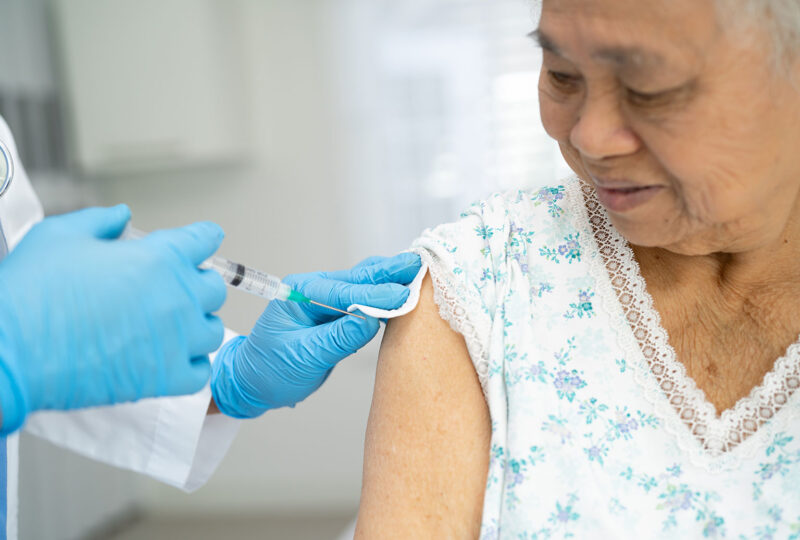Coming down with the flu is usually a miserable experience for anyone, but it can be especially dangerous to older adults. Peak flu season lasts from October through March and vaccines are available throughout this period, but should you get one as soon as they’re available or is it OK to wait? What’s the time period for flu shot effectiveness and how long does the flu shot last? We asked our experts for their best advice on when to get the flu shot.

Elliot Montgomery Sklar
Typically, September or October are the recommended months for seniors to get a flu shot (per the CDC and other international health authorities). This is based upon the months the flu typically spreads (during the winter) and allows the recipient to have the strongest level of protection from the flu shot during that time.
The Weather Channel app and other websites and apps share flu outbreak maps across the country, which can help people in deciding with their doctors or pharmacists what is right for them in case there’s an early flu outbreak.

Jesse Houghton, MD, FACG
According to the CDC, individuals ages 65 and older should be vaccinated in either September or October, as peak flu season usually occurs in the winter months. Because it takes roughly two weeks for adequate immunity to develop after vaccination, this will provide well-timed protection for seniors. It should be noted that seniors may not develop as robust an immune response as younger individuals, and this response in seniors may not last as long, making timing of vaccination more important for seniors.
Seniors may not develop as robust an immune response as younger individuals, and this response in seniors may not last as long, making timing of vaccination more important for seniors.

Ann Kriebel-Gasparro
The Centers for Disease Control (CDC) recommends getting a flu shot starting in September, up until the end of flu season in January. People 65 years and older are at higher risk of developing serious flu complications like pneumonia and hospitalizations compared to younger adults because immunity decreases naturally with age.
People 65 years and older are at higher risk of developing serious flu complications like pneumonia and hospitalizations compared to younger adults because immunity decreases naturally with age.
The influenza vaccine is a different mixture each year because the flu virus mutates—there are more than 200 of them! Immunity goes in effect about two weeks after the shot; your body will develop antibodies that stay in your system for about a year to protect you from a flu infection. Afterward, some people may feel the stimulation of the immune system making antibodies, which can lead to a fever, achiness, muscle aches and headache. Despite these possible side effects, the vaccine does not give you the flu.
For adults over 65, the recommended vaccine is Fluzone High-Dose Quadrivalent. Manufactured by Sanofi, this high-dose vaccine is more effective than the standard dose for older adults because they have weaker immune systems, a natural effect of aging. This vaccine has been very effective in protecting seniors against flu infections. Additionally, if you had the regular flu shot last year, you can still get the high-dose flu shot this year.
There are many places to receive the flu shot. You can make an appointment with your primary care provider or your local pharmacy. Often, you can walk into a grocery store or pharmacy and receive your flu shot without an appointment any time after September. If you do have side effects, taking a pain reliever or fever reducer like Tylenol and resting for a day or two will help. And remember, this is much better than having the flu!
If you do have side effects, taking a pain reliever or fever reducer like Tylenol and resting for a day or two will help. And remember, this is much better than having the flu!

Dr. Sandra Petersen
The flu season is generally thought to last from October to May; most health care providers feel that getting a flu shot in October is a good idea.
As a general rule, it takes about two weeks for the human body to build immunity once a vaccine is given, so early to mid-October works well for young-to-middle-aged individuals. This may differ slightly for older adults.
About 80% to 90% of deaths from flu occur in older adults. We know that people aged 65 and older may not have as extensive an antibody response as those who are younger. For that reason, many feel it may be optimal for them to wait to get a flu vaccination until between Halloween and Thanksgiving. Older adults should ask whether the high-dose flu shot is a good choice for them, as that may help them develop additional immunity.
However, once the body is exposed to a particular strain of the flu, immunity prevails for the rest of the season. It is necessary to note, as well, that vaccines are not 100% effective; that is, even though you’re vaccinated, you might still contract the flu. Those who have vaccinations, however, tend to avoid severe illness.
Vaccines are not 100% effective; that is, even though you’re vaccinated, you might still contract the flu. Those who have vaccinations, however, tend to avoid severe illness.

